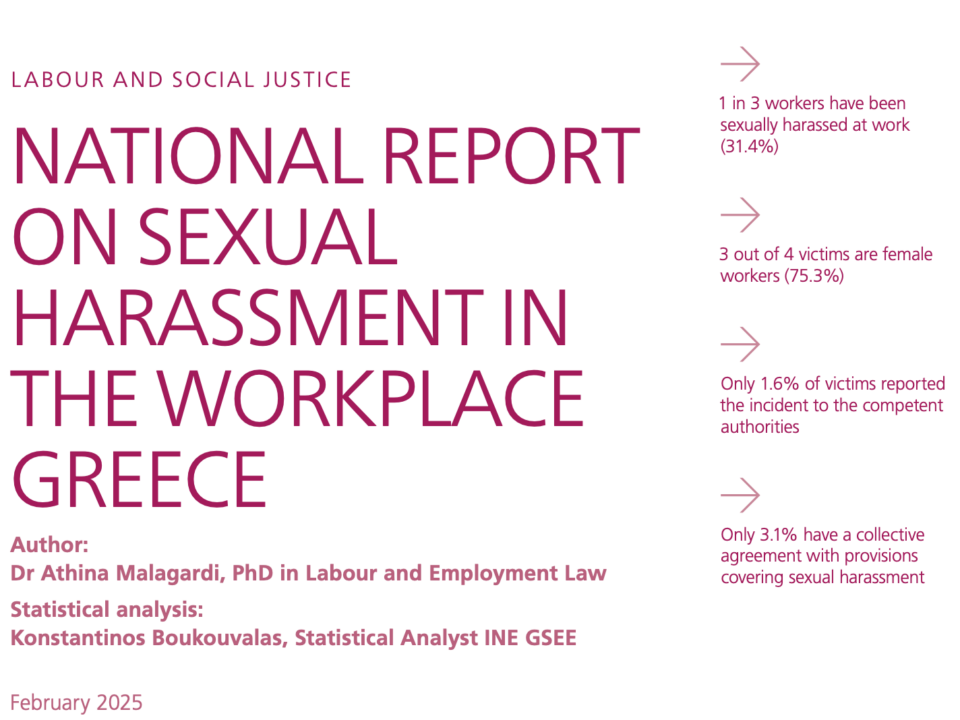It is expected that the dynamic growth of artificial intelligence will bring with it changes to the global economy, with many experts talking about a new Industrial Revolution. On one hand, artificial intelligence brings with it the promise of increased productivity and economic growth. A study conducted by Deloitte and the Federation of Hellenic ICT Enterprises (SEPE) predicts that the cumulative impact of Generative AI in Greece will reach +5.5% of the country’s GDP by 2030, i.e. 10.7 billion euros. (1)
On the other hand, there is widespread concern about how this technology might affect the labour market and whether it will compound existing income inequalities. According to a study by the International Monetary Fund, 40% of global employment will be affected by the changes artificial intelligence will bring with it. In the case of advanced economies, this number rises to 60% of total employment. (2)
In advanced economies, it is expected that there will be a positive impact for 27% of jobs. This applies to forms of employment characterised by a high degree of automation, but also a high degree of complementarity with technology. (3) Workers in these fields will benefit from the integration of artificial intelligence systems. They are occupations that involve a high degree of responsibility and interpersonal interactions, such as those performed by surgeons, lawyers and judges. Artificial intelligence is expected to support occupations such as these in their daily operations, by analysing medical images for instance, but it will not replace the workers.
On the other hand, 33% of jobs in advanced economies are characterised by a high degree of automation, but a low degree of complementarity. (4) There is greater risk of worker displacement by artificial intelligence systems in this category. This concerns professionals providing secretarial support services, machine operators and translators, amongst others. In low income economies, where the proportion of workers that falls within this occupational category is smaller, automation is expected to have a negative impact on 18% of the human capital.
The overall impact of automation will also determine how artificial intelligence will affect income inequalities. If the complementarity between high-income workers and artificial intelligence is strong, then it is expected that there will be a disproportionate increase in their earnings, leading to an exacerbation in income inequality. At the same time, the increase in productivity will lead to increased return to capital for the owners of artificial intelligence technologies, even further amplifying the problem. (5)
Finally, artificial intelligence is expected to also affect cross-country income inequalities. (6) Advanced countries have a greater degree of preparedness for the integration of artificial intelligence technologies into their economic productivity and for the reaping of the respective financial benefits. In contrast, the lack of suitable digital infrastructure and the lack of digital skills in developing economies may lead to widening the divide with northern countries globally. (7)
All in all, it is expected that artificial intelligence will change the labour market at a national level, whilst it will also affect economic interrelations across countries. Whilst there is no broad consensus as to the precise impact of technology, it is becoming evident that a proactive approach is required at the national and European political levels. The following two categories of metrics are often proposed as possible solutions to the uncertainty inherent in technological shifts: guaranteed incomes and taxation of capital. (8)
Firstly, the concept of a Universal Basic Income has been debated extensively as a possible solution to address the changes that artificial intelligence is bringing with it. It is a guaranteed and unconditional form of income support that governments can potentially provide to citizens. The main criticism of Universal Basic Income, that is, that it reduces incentives to work, has not been confirmed further to a study of such a scheme implemented in Kenya. (9) At the same time, it is believed that a guaranteed basic income would have a positive psychological impact on workers who are facing heightened insecurity due to rapid advancements in technology. That said, empirical data on the universal impact that such a policy would have remain limited.
Secondly, the taxation of capital returns from artificial intelligence systems has also been debated extensively. Prominent businesspeople and politicians have also proposed the concept of a “robot tax”, essentially a tax on the replacement of human workers with automated systems and/or industrial robots. O’Keefe et al. have put forward a proposal whereby artificial intelligence companies would make a voluntary commitment to donate a significant amount of their profits, in the event that these profits are unexpectedly high and exceed 1% of global economic productivity. (10)The main motivation for companies to agree to such a commitment would be to mitigate political risk, resulting for example from destabilising social responses, as well as the possibility of adverse political measures being taken against them. Lastly, Korinek and Stiglitz have proposed the creation of sovereign wealth funds to which the relevant firms will contribute in the interests of ensuring intergenerational prosperity and equality. (11)
As for Greece, the country is lower on the artificial intelligence preparedness index than the majority of European Union member states, including Lithuania, Poland and the Czech Republic. (12) According to the European Commission, only 4% of Greek businesses have integrated artificial intelligence systems into their operations. (13) If these trends are not reversed, Greece will not be able to leverage the benefits of technological change and it may end up encountering the challenges above.
The National Strategy for the Development of Artificial Intelligence, which is a work in progress, will need to take the above factors into account. Digital skills will have to take centre stage in this strategy and it will be necessary to examine the development of relevant skills in both secondary and tertiary education, irrespective of vocation or academic department. As part of this framework, initiatives to reinforce Brain Gain in the country are also necessary to attract, through appropriate incentives, emigrants who are highly specialised in artificial intelligence. Further, support is required from small and medium-sized enterprises to expedite the integration of artificial intelligence into their operations and to be able to increase their productivity. Finally, encouraging start-up businesses to develop innovative artificial intelligence systems can lead to a cycle of creativity and dispersion of technology services and products throughout the country.
Beyond reinforcing preparedness for the integration of artificial intelligence, it will be necessary to begin comprehensive discussions about how to manage a scenario in which there will be mass displacement of workers in the coming years. These discussions should take place at a European level, since the European Union has pioneered reining in and imposing taxes on technology giants. At the same time, the impact of artificial intelligence is yet another factor reinforcing demands for a more “Social Europe”, meaning the adoption of policies at a European level that will place emphasis on the prosperity of citizens and the management of inequalities in an age of rapid changes in technology.
(1) Deloitte & SEPE. (2023). The impact of Gen AI on the Greek economy.
(2) Cazzaniga, M. et al. (2024). Gen-AI: Artificial Intelligence and the Future of Work. IMF Staff Discussion Note SDN2024/001.
(3), (4) Ibid.
(5) Freeman, R. (2015). Who owns the robots rules the world. IZA World of Labor.
(6) Rehman, C. et al. (2020). Will the AI revolution cause a great divergence? IMF.
(7) Cazzaniga, M. et al. (2024).
(8) Peppiatt, C. (2024). The Future of Work: Inequality, Artificial Intelligence, and What Can Be Done About It. A Literature Review.
(9) Banerjee, A. et al. (2023). Universal Basic Income: Short-Term Results from a Long-Term Experiment in Kenya.
(10) O’Keefe, et al. (2020). The Windfall Clause: Distributing the Benefits of AI for the Common Good.
(11) Korinek, A. and Stiglitz, J. (2021). Artificial Intelligence, Globalisation, and Strategies for Economic Development. NBER Working Paper 28453.
(12) Cazzaniga, M. et al. (2024).
(13) European Commission (2024). Greece 2024 Digital Decade Country Report.
Source: Eteron, https://eteron.org/techniti-noimosyni-ergasia-kai-oikonomiki-anisotita/
-
 Giorgos Verdi
Giorgos Verdi
Policy Fellow at European Council on Foreign Relations




